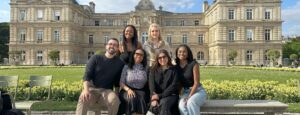The following is Sheila Xu WG’24’s firsthand experience navigating the Wharton MBA Program as part of the Deaf community. Wharton Stories also invites you to listen or read a transcript of the Knowledge at Wharton podcast in which Miss Xu speaks more on improving accessibility in the workplace and the aeronautical industry writ large.
Born deaf to hearing Chinese immigrant parents who moved to the U.S. for higher education, my life has been a unique journey of resilience, determination, and self-advocacy. I received a Cochlear Implant at the age of three and was raised speaking English – at that time, the prevailing thought was that deaf children could not learn multiple languages, a notion now disproven by recent research.
My time at the Massachusetts Institute of Technology (MIT) marked a pivotal period in my life. While pursuing a joint undergraduate major in Earth, Atmospheric, and Planetary Sciences and Science, Technology, and Society, I immersed myself in Boston’s deaf community and learned American Sign Language (ASL). There, I further developed the ability to adapt my mode of communication depending on the person and situation with which I am interacting.

My undergraduate internships at NASA Jet Propulsion Laboratory (NASA JPL) and the Department of Transportation sparked my interest in the aviation and aerospace sectors. Then, in 2021, I made history as the first deaf Asian female pilot, joining the ranks of the approximately 200 deaf pilots nationwide and pushing the boundaries of what is deemed achievable for people like me. These experiences above have shaped my Deaf identity and fueled my drive to break barriers and stereotypes for the deaf and hard-of-hearing.
Navigating the Wharton MBA Program
Now, as someone entering my final year of graduate school whilst enrolled in both Wharton’s MBA Program and Harvard’s Master of Public Policy Program via a dual degree program supported by both schools, I am navigating and applying my unique perspective to two demanding academic programs.

Being the sole deaf student at Wharton, self-advocacy and seeking help when needed became crucial skills. With the support of the Weingarten Center and Wharton, I established an accessible system for myself to ensure a full, high-quality, and equitable participation in all aspects of academics and student life. This included a dedicated on-site ASL interpreter and coordinator who liaised with faculty and administrators, managed a team of ASL interpreters to provide full coverage, and relieved me of additional tasks of setting up access services, allowing me to focus on my studies and student life.
My graduate studies are equipping me with the tools and network to push for systemic changes that benefit the DHH and disability community within and out of Wharton. I may be the only deaf student at Wharton, but it doesn’t mean I can’t build a supportive community around me.
Flying in zero-gravity with a mission: AstroAccess
Beyond academics, my passion for the space sector led me to Mission: AstroAccess (“AstroAccess”), a nonprofit dedicated to advancing disability inclusion in space. Since mid-2022, I’ve been volunteering with this organization, and now serve as Deputy Director of Development and Treasurer. In this role, I apply the business acumen gained from my Wharton education to devise strategies for the organization, which includes securing corporate contracts and sponsorships, forging partnerships, and managing finances.
My journey with AstroAccess took off during a commercial analog astronaut training program at Biosphere2 and University of Arizona in Tucson, Arizona, in November 2022. Alongside two other AstroAccess members, I participated in various training sessions, such as spacecraft fire emergency procedures, Mode 8 egress, and spacesuit pressurization training. This marked a historic moment, as it was likely the first time deaf participants underwent a commercial analog astronaut training, proving that deaf people can indeed be trained as astronauts.

I also had the opportunity to conduct experiments in a zero-gravity environment on a Zero-Gravity Corporation’s parabolic flight in Houston, Texas, alongside 14+ AstroAccess crew members comprising groups of varying disabilities (blind, mobility, and DHH) and other supporters. My deaf colleague and I were tasked with evaluating the legibility of ASL communication in abnormal orientations in zero-gravity. We partnered with SonicCloud and Sony to adapt SonicCloud’s personalized hearing software with Sony headsets for noise control in a zero-gravity environment for both DHH and hearing crew. Even while we were conducting our experiments, the sensation of floating, leaping, and executing flips in a lunar, martian, and zero-gravity is an unparalleled and exhilarating experience like no other.
Our zero-gravity parabolic flight and experiments aimed to demonstrate the feasibility of astronauts and space explorers with disabilities. It underscored the importance of universal design in the space sector, proving that systems designed with people with disabilities in mind benefit everyone, regardless of their abilities.
How Wharton tied it all together
None of those experiences would have been possible without support from a Wharton professor who acknowledged the profound impact of my work and provided financial support for my research work with AstroAccess. Under the mentorship of Assistant Professor of Management Stephanie Creary, I authored a case study focusing on strategies for disability and diversity, equity, and inclusion (DEI) within the space sector, using AstroAccess and my own experiences as examples.
This case study offers an in-depth exploration of disability DEI challenges and advancements in the space industry, as well as a personal narrative of breaking barriers and challenging stereotypes of people with disabilities as potential astronaut candidates. The professor plans to incorporate this case study into their future curriculum, providing a real-world perspective and encouraging Wharton students to challenge the status quo in their chosen fields.
My journey as a deaf student at Wharton and an aspiring deaf astronaut, along with my work with AstroAccess, is preparing me for a leadership role ready to make an impact at the intersection of space, business, policy, and disability. I hope my story inspires others to navigate their life challenges successfully, pursue their passions, and recognize that an MBA education is within reach.
— Sheila Xu WG’24
Posted: September 22, 2023




















